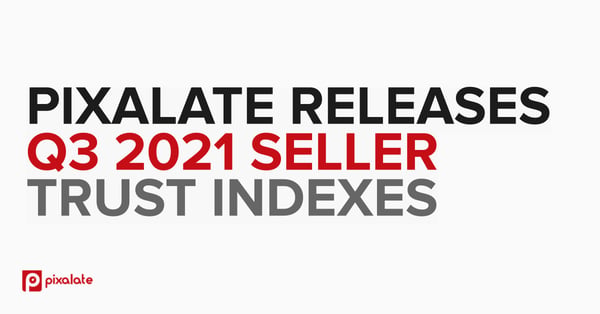


This week's review of ad fraud and quality in the digital advertising space.

Pixalate has released the Q3 2021 Programmatic Seller Trust Indexes - the worldwide standard in programmatic advertising quality ratings. The indexes evaluate and rank the quality of programmatic advertising supply-side platforms (SSPs) across desktop and mobile web, mobile in-app, and Connected TV (CTV).
In this blog, you can find insights about top ad sellers across platforms.

The Trade Desk encountered an obstacle to properly test Unified ID 2.0 in Europe by troubles finding an independent administrator governing the use of UID2 in countries where GDPR is in force. "This administrator would very likely be on the hook for any violations of GDPR, a hefty liability that’s scaring off potential administrators," according to AdExchanger.
According to the newest research conducted by FairPlay, Global Action Plan, and Reset Australia, Meta (formerly Facebook) still tracked teenagers across its social platforms. "Researchers found evidence that Meta is collecting information, particularly from tracking pixels, and appending that data to users’ accounts. Meta denied that it's using this tracking data to personalize ads to kids, but it didn't elaborate on why the data is still being collected," informs eMarketer.

"The Treasure Department has in recent months expanded its digital surveillance powers, contracts provided to The Intercept reveal, turning to the controversial firm Babel Street, whose critics say it helps federal investigators buy their way around the Fourth Amendment," informs The Intercept.

This week, Pixalate hosted a webinar and, together with partners, published an interview and Q&A focusing on quality in programmatic advertising. From these three resources, you can learn insights about CTV ad supply chain trends, fighting ad fraud in the omnichannel ecosystem, and the best practices in maintaining quality programmatic CTV advertising:
*By entering your email address and clicking Subscribe, you are agreeing to our Terms of Use and Privacy Policy.
These Stories on Weekly Recaps
*By entering your email address and clicking Subscribe, you are agreeing to our Terms of Use and Privacy Policy.

Disclaimer: The content of this page reflects Pixalate’s opinions with respect to the factors that Pixalate believes can be useful to the digital media industry. Any proprietary data shared is grounded in Pixalate’s proprietary technology and analytics, which Pixalate is continuously evaluating and updating. Any references to outside sources should not be construed as endorsements. Pixalate’s opinions are just that - opinion, not facts or guarantees.
Per the MRC, “'Fraud' is not intended to represent fraud as defined in various laws, statutes and ordinances or as conventionally used in U.S. Court or other legal proceedings, but rather a custom definition strictly for advertising measurement purposes. Also per the MRC, “‘Invalid Traffic’ is defined generally as traffic that does not meet certain ad serving quality or completeness criteria, or otherwise does not represent legitimate ad traffic that should be included in measurement counts. Among the reasons why ad traffic may be deemed invalid is it is a result of non-human traffic (spiders, bots, etc.), or activity designed to produce fraudulent traffic.”



